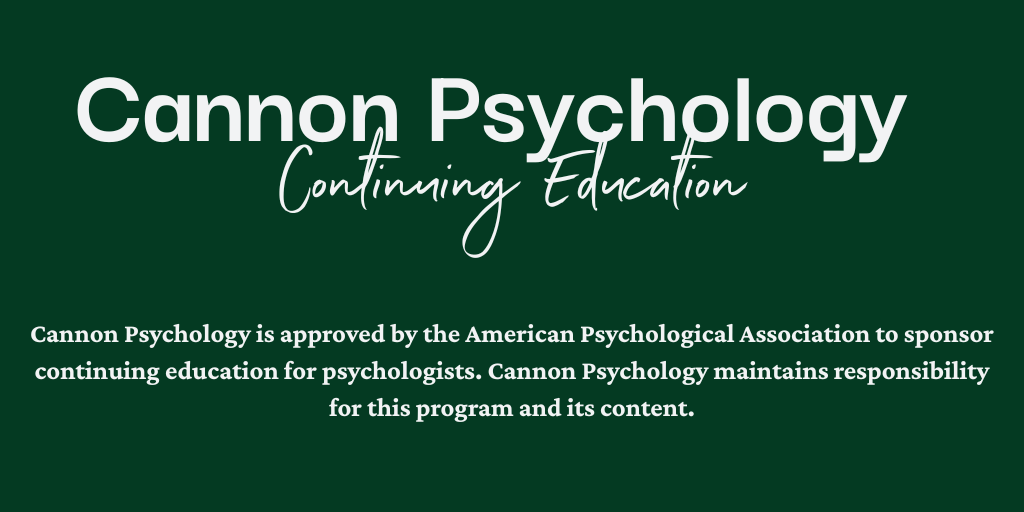

EMDR Treatment and Training Resource Hub
Welcome to the EMDR Hub, a central resource for psychologists who want to strengthen their clinical skills in Eye Movement Desensitization and Reprocessing therapy. Here you’ll find blog series, case examples, treatment planning strategies, and research-driven discussions to help you integrate EMDR into your practice with confidence.
This hub organizes all EMDR-related content, including Target Selection and Sequencing, EMDR Phase 1 History Taking and Treatment Planning, and other advanced applications. Over time, additional series will be added here to support your continuing education journey through Cannon Psychology Continuing Education — an APA-Approved Sponsor.
Featured CE Course: EMDR Target Sequencing & Treatment Planning
If you’re ready to strengthen your EMDR conceptualization skills, start with the EMDR Treatment Planning: Target Selection and Sequencing CE Course. This course provides a detailed framework for treatment planning, along with downloadable handouts such as the EMDR Target Selection Clinician Handout, EMDR Target Selection Client Handout, and the EMDR Target Sequencing Clinician Guide. You can also access these materials as part of the Core EMDR Target Selection & Sequencing Toolkit, a professional bundle designed for Phases 1–2 of EMDR treatment planning.
Explore the full 5-part series on treatment planning in EMDR:
Why Target Selection and Sequencing Matter in EMDR – Why sequencing matters for efficient and ethical EMDR treatment.
Timelines and Float Back in EMDR Target Selection – How float back and target timelines help uncover feeder memories.
Advanced Approaches to EMDR Target Sequencing – Strategic methods for sequencing in complex trauma cases.
EMDR Treatment Plan Strategies: Advanced Planning Methods – How to structure advanced EMDR Master Treatment Plans.
Research-Driven Strategies for EMDR Target Sequencing – Evidence-based approaches for EMDR Target Selection and Sequencing.
Additional EMDR Treatment Planning Resources
To deepen your treatment planning skills beyond the core 5-part series, these additional resources provide advanced guidance for developing comprehensive EMDR Master Treatment Plans. These articles offer case formulation support, examples of Phase 1 clinical decision-making, and strategies for applying treatment planning principles to complex trauma presentations. Each resource is designed to help you strengthen your conceptualization skills, refine target identification, and build a clear, ethically sound roadmap for EMDR treatment.
Articles in This Section:
EMDR Phase One: How to Write an EMDR Treatment Plan for PTSD
Theoretical Foundations of EMDR Therapy
A strong understanding of EMDR’s theoretical foundations allows clinicians to make clearer case conceptualization decisions, anticipate client responses, and adapt treatment to complex presentations. This section includes key concepts such as the Adaptive Information Processing (AIP) model, trauma memory storage, dissociation, and EMDR history. These resources support deeper clinical reasoning and help therapists strengthen the conceptual framework behind EMDR treatment planning.
Articles in This Section:
EMDR Tools, Skills, and Techniques
These resources provide practical guidance on the clinical tools therapists use throughout EMDR preparation and reprocessing. From managing client disclosure, to using Flash, to helping clients anticipate common reactions, these articles support skill-building in real-world EMDR work. They can be integrated into Phases 1–7 and used alongside your treatment planning strategies.
Articles in This Section:
EMDR for Complex Trauma and Dissociation
Working with complex trauma often requires careful pacing, expanded Phase 2 preparation, and a deeper understanding of dissociation and internal parts work. These resources help clinicians recognize dissociative processes, adapt protocols for medical or occupational trauma, and support clients with chronic trauma histories. This section strengthens your ability to provide safe, attuned, and phase-appropriate EMDR for complex presentations.
Articles in This Section:
EMDR for Addiction and Problematic Behaviors
Applying EMDR to substance use and behavioral addictions requires specialized protocols, careful Phase 1 assessment, and thoughtful Target Selection and Sequencing. These resources explore evidence-based approaches—such as DeTUR, CravEx, FSAP, and Flashforward—and offer clinician-facing guidance for integrating EMDR within recovery-oriented treatment plans. For more advanced work, see the Addiction Treatment & Recovery Hub.
Articles in This Section:
Advance Your EMDR Treatment Planning Skills
EMDR in Telehealth and Online Practice
Providing EMDR therapy through telehealth requires thoughtful preparation, clear informed consent, and strong attention to safety, pacing, and stabilization. These resources support clinicians who are adapting EMDR to virtual settings, helping you understand client readiness, session structure, and what to anticipate when working remotely. For guidance on legal and ethical considerations in telepsychology, visit the Laws & Ethics Hub.
Articles in This Section:
Client-Friendly EMDR Guides (Shareable Resources)
These articles were originally written for clients and offer simple, trauma-informed explanations of each EMDR Phase. Therapists can share these with clients who want to understand EMDR in clear, accessible language. These are not CE materials, but they can support informed consent, readiness, and preparation.
Additional Client-Facing EMDR Resources
Cannon Psychology is approved by the American Psychological Association to sponsor continuing education for psychologists. Cannon Psychology maintains responsibility for this program and its content

